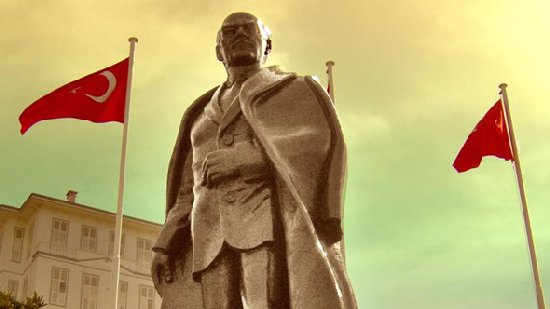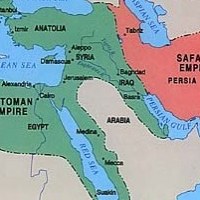Published: Hurriyet Daily News, may 16, 2010; Turkey’s New Political Balance: Old AKP and New Kemalism.
By Soner Cagaptay,

Ataturk statue (kemalism is the principle that defines the basic characteristics of the Republic of Turkey. It was developed by the Turkish national movement and its leader Mustafa Kemal Atatürk.)
Turkey’s protracted political battle between the governing Justice and Development Party, or AKP, and its opponents reached a crescendo this month with the Turkish Parliament’s vote on proposed constitutional amendments.
The battle over the amendments represented the zenith of the country’s dangerous polarization between two broad political camps congregated around Islamists and secularists. The two sides are in an all-out struggle against one another, and neither feels it can afford to lose. The mantra of Turkish politics in summer 2010: Eat your opponents for lunch or else they will eat you for dinner.
The changes to the Constitution promise to give the AKP, which already has control over the executive and legislative branches of government, the powers to appoint high court judges and shape the judiciary in its image.
Such a development would be the near end of the secular, pro-Western Turkey we have come to know since Ankara became a multi-party democracy in 1946 and dropped anchor in the West in 1947. Turkey, run by secular parties between 1946 and 2002 and by the AKP, a party with roots in political Islam, since 2002, is now severely split between secularists and Islamists.
The struggle between the two sides has already taken alarming turns. There have been coup allegations against the AKP, followed by the Ergenekon case, which the government has not only used to prosecute these allegations, but also crack down on its secularist opponents. The AKP has also levied massive tax fines against independent media. Furthermore, the judiciary is split along ideological lines. Islamist and secularist powers stubbornly continue to attempt to destroy one another.
Turkey, however, has a way out of this conundrum if it can reinvent Kemalism at the same time that the AKP agrees to share the spoils of political power. This would require both wisdom and vision. After eight years of unbroken AKP rule and the consequent rise of a conservative, political, economic and intelligence elite to support the party, it is likely Turkey will not ever be the same as it was before 2002. Yet, secular Turks, with their supporting media, businesses, lobby groups, political parties and nongovernmental organizations, as well as their sheer numbers, will not simply disappear.
Opinion polls that measure attitudes toward the AKP and its conservative values suggest that 32 percent to 38 percent of Turks (upward of 25 million people) would never support the AKP or want to live in a country shaped solely by its values.
This, then, is the recipe for the new Turkey: The country must provide room for everyone.
Considering its transformation under the AKP, Turkey will find it difficult, if not impossible, to return to its 1990s position. Still, Turkey must avert political deadlock and polarization. To this end, Kemalism must first be reinvented as New Kemalism.
New Kemalism is not pre-Kemalism – I am not calling for the return of Caliphate – nor is it anti-Kemalism; I am, of course, not asking for an end to women’s emancipation. Rather, New Kemalism is Kemalism 2.0, updated and recast to preserve the liberal aspects of a Kemalist polity. It asserts the separation of religion and government, but jettisons authoritarianism and anachronistic aspects of traditional Kemalism.
New Kemalism would necessarily be open-minded toward social conservatism while maintaining the separation of religion and government. In this regard, the relationship between the government and religion would be redefined. The state would be equally distant from all faiths, or lack thereof. Laws would ensure that religion be kept outside the body politic, while an ombudsman would watch out for the rights of people who practice Islam, as well people who do not practice, a necessary institution in a country where 99.9 percent of the people are of the same religion.
Finally, New Kemalism would boost traditional Kemalism’s commitment to Turkey’s European vocation while reguiding it toward more liberal values. In the early 20th century, Mustafa Kemal Atatürk, the founder of modern Turkey, wanted the country to go West, and that remains Kemalism’s goal. Europe, however, has moved figuratively further West since then. Joining this new Europe, the European Union of liberal values, has to be New Kemalism’s driving mantra.
In agreeing to share political power, the AKP must also adjust itself to encompass Turkey’s Kemalist legacy and strength.
What interest does the AKP and its allies have in sharing power? Secular Turkey is too large for the AKP to digest even if the party were successful in eating its secularist opponents for political lunch. Even with its newfound weight, the AKP cannot afford to ignore modern Turkey’s historical make-up without further breaking the country.
Hence, the AKP would benefit by choosing to coexist with its political adversaries. This stance flourished within the party when the AKP sought Turkey’s accession into the European Union and consensus in politics. However, when accession talks stalled in 2005 and the AKP won an intoxicating landslide electoral victory soon after, in 2007, the party shifted from building consensus to authoritarian politics. It curbed media freedoms and cracked down on dissent. The AKP’s recent shift in stance contrasts starkly with the party’s erstwhile politically pliable format.
The vision of a new Turkey that provides room for everyone requires a new and lasting political balance between the old AKP and New Kemalism. The country’s ruling party must re-embrace liberalism, while its Kemalist adversaries must evolve. Otherwise, Turkey will crumble from the pressures of increased polarization between the new AKP and traditional Kemalism.



 RSS
RSS










[…] 2. Russia has just signed a major arms’ deal with Syria and is moving toward being diplomatic patron and arms’ supplier of an Iran-Syria-Turkey-Hamas-Hizballah alliance. While the United States has tremendous potential leverage over Russia, it isn’t being used and the administration continues to pretend Moscow will support serious sanctions against Iran. Meanwhile, Russia is rebuilding its hegemony over former Soviet territories and neighbors. And the Obama Administration is blind toward Turkey’s defection to the other side and the growing Islamism within Turkey itself. […]
[…] The AKP has also levied massive tax fines against independent media . Furthermore, the judiciary is split along ideological lines. Islamist and secularist powers stubbornly continue to attempt to destroy one another View original post here: Turkey's New Political Balance: Old AKP and New Kemalism | Middle … […]
Turkey’s New Political Balance: Old AKP and New Kemalism #turkey #islamism http://j.mp/dtwptb
Turkey’s New Political Balance: Old AKP and New Kemalism #turkey #islamism http://j.mp/dtwptb
Turkey’s New Political Balance: Old AKP and New Kemalism #turkey #islamism http://j.mp/dtwptb
Turkey’s New Political Balance: Old AKP and New Kemalism #turkey #islamism http://j.mp/dtwptb
Turkey’s New Political Balance: Old AKP and New Kemalism #turkey #islamism http://j.mp/dtwptb
Turkey’s New Political Balance: Old AKP and New Kemalism #turkey #islamism http://j.mp/dtwptb
RT @CrethiPlethi: Turkey’s New Political Balance: Old AKP and New Kemalism #turkey #islamism http://j.mp/dtwptb
RT @CrethiPlethi: Turkey’s New Political Balance: Old AKP and New Kemalism #turkey #islamism http://j.mp/dtwptb
RT @CrethiPlethi: Turkey’s New Political Balance: Old AKP and New Kemalism #turkey #islamism http://j.mp/dtwptb
RT @CrethiPlethi: Turkey’s New Political Balance: Old AKP and New Kemalism #turkey #islamism http://j.mp/dtwptb
[…] This post was mentioned on Twitter by Elisabeth, Crethi Plethi. Crethi Plethi said: Turkey’s New Political Balance: Old AKP and New Kemalism #turkey #islamism http://j.mp/dtwptb […]